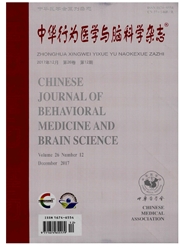

 中文摘要:
中文摘要:
目的:探讨多巴胺能药物对早期帕金森病( Parkinson’ disease,PD)患者模糊风险决策能力的影响。方法采用爱荷华博弈任务( Iowa gambling task,IGT)对24例早期未用药原发性PD患者( Hoehn-Yabr分级≤Ⅱ级)、24例早期规律口服多巴胺能药物的原发性PD患者以及24例年龄、性别及受教育程度匹配的正常对照,进行模糊风险决策能力的测试。结果与正常组相比,未用药PD组不仅存在数字广度及词汇流畅性障碍,还存在决策功能障碍。三组在博弈任务中总净剩值差异有统计学意义(F=6.024, P=0.004),未用药 PD组的总净剩值[(-4.50±22.19)分]低于用药 PD 组[(8.83±23.24)分]及正常对照组[(15.92±15.77)分](P<0.05)。未用药PD组与用药PD组在5个block中的净剩值两两比较显示,从block1至block5两组净剩值间的差异逐渐增加,并且在block5的净剩值差异有统计学意义(P<0.05)。用药PD组在5个block的净剩值及总净剩值与正常组相比,差异无统计学意义(均P>0.05)。随着博弈任务卡片选择次数的增多,用药PD组有利选择次数逐渐增加;而未用药PD组有利选择次数未见明显增加趋势,倾向风险选项。研究还表明,未用药PD组的总净剩值与MoCA得分有相关性( r=0.614, P=0.001)。结论早期原发性PD患者在风险概率不明确条件下存在决策能力受损,偏爱选择风险大的选项。当规律的外源性的补充多巴胺能药物3到12个月,帕金森病患者的模糊风险决策能力得到明显改善。
 英文摘要:
英文摘要:
Objective To investigate the effects of dopaminergic medication on decision-making un-der ambiguity in patients with early Parkinson's disease( PD) . Methods Using Iowa Gambling Task ( IGT) for 24 early non-medication idiopathic PD patients( Hoehn and Yahr Scale≤Ⅱlevel) ,24 early idiopathic PD patients with regular dopaminergic medication and also for 24 healthy controls( HC) whose age,gender,and education match to PD patients to test their ability of decision-making under ambiguity. Results The results showed non-medication PD group showed impairments on digtal span and verbal fluency and decision-making task. There was significant difference in IGT task scores among the three groups(F=6.024, P=0.004) . The total net scores of advantageous choices in IGT were significantly lower in non-medication PD group( (-4.50 ±22.19) scores) than medication PD group((8.83±23.24)scores) and healthy group((15.92±15.77) scores) . The difference of net scores in block1 to block5 between non-medication PD group and medication PD group was gradually increased,and the difference of net scores in block5 was significant(P〈0.05) . There was no significant difference in total net scores and net scores in block1 to block5 between medication PD group and healthy group(P〉0.05) . As the game processing,medication PD group gradually shifted their se-lections toward the advantageous choices. But non-medication group did not exhibit this shift pattern and the performance was much poorer. Meanwhile, the study also indicated the total net scores of advantageous choices for non-medication PD group was positive correlation to the MoCA scores ( r=0.614, P=0.001). Conclusion The present study has shown that non-medication PD group has impairment in decision-making under ambiguity risk condition and prefer to choose risky options. when exogenous complement dopaminergic medication,the risk decision-making ability of medication PD group has been improved.
 同期刊论文项目
同期刊论文项目
 同项目期刊论文
同项目期刊论文
 Dissociation of decision making under ambiguity and decision makingunder risk: A neurocognitive endo
Dissociation of decision making under ambiguity and decision makingunder risk: A neurocognitive endo Selective impairment of attention networks in breast cancer patients receiving chemotherapy treatmen
Selective impairment of attention networks in breast cancer patients receiving chemotherapy treatmen Dissociation of decision making under ambiguity and decision making under risk: A neurocognitive end
Dissociation of decision making under ambiguity and decision making under risk: A neurocognitive end Trait-related decision making impairment in obsessivecompulsive disorder: evidence from decision mak
Trait-related decision making impairment in obsessivecompulsive disorder: evidence from decision mak Dissociation of Neural Substrates of Response Inhibitionto Negative Information between Implicit and
Dissociation of Neural Substrates of Response Inhibitionto Negative Information between Implicit and Selective impairment of attention networks in breast cancerpatients receiving chemotherapy treatment
Selective impairment of attention networks in breast cancerpatients receiving chemotherapy treatment Modul- ation of interhemispheric functional coordination in electroconvulsive therapy for depression
Modul- ation of interhemispheric functional coordination in electroconvulsive therapy for depression 期刊信息
期刊信息
